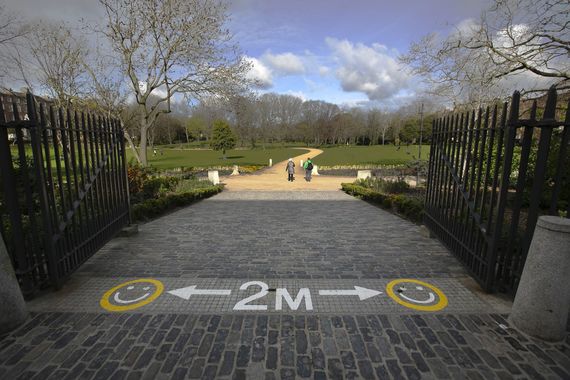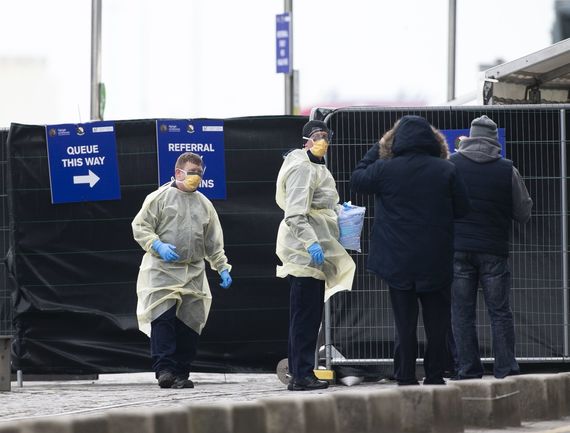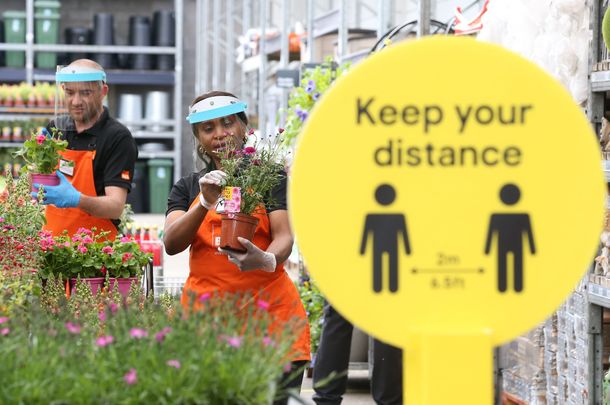The people of Ireland were beside themselves with delight this week to be able to do these simple things again as Ireland took the first tentative step towards easing the full lockdown which has been in place since March 24.
This is the start of the first stage of the five-stage plan to open Ireland up again, both our society and our economy. Each stage will last three weeks, and progress from one stage to the next will depend on the R number -- the transmission rate of the virus -- remaining very low.
Read more: Reopening begins in Ireland with stark warnings for the future
Apart from allowing garden centers and hardware stores to open, there is not much more in the first stage. Construction sites and outdoor businesses can open with social distancing. Most offices, businesses, and shops, as well as schools and colleges, remain closed. Bars and restaurants are still shut.
People can now meet in small groups of four, but it must be within five kilometers of where they live. Older folk are still advised to stay home, apart from outdoor exercise. The social distancing of two meters everywhere is still required.

Irish are now free to meet in groups of no more than four as long as 2-meters social distance is maintained.
Everyone is asked to wear masks in shops and on public transport. Non-essential travel is still not allowed.
So it's not much, but the slight easing of restrictions has given people the reassurance that we're heading in the right direction. This was confirmed in recent days when the daily figures showed that the number of new cases was well below 100 and the number of deaths was in the 10 to 20 range. The number of COVID-19 cases in hospitals was also way down, as was the number of people in ICUs.
The last time we saw such good numbers was in the middle of March when the lockdown started. On some days in April we were seeing over 500 new cases a day, so getting it below 100 is significant progress.
Of course there may still be small spikes in the numbers on some days to come, but the trend is definitely downwards. Even so we have to be very careful and, as the Minister for Health Simon Harris said last weekend, caution and common sense remain vital.
Minister for Health Simon Harris.
We cannot put the progress we have made in jeopardy by foolishly thinking this is over. The reality is we're a long way from that, and if people are stupid we could see the numbers climbing sharply again. That has been stressed by the Chief Medical Officer Dr. Tony Holohan (our Dr. Fauci) and his team of experts who are advising the government.
The key to making even more progress, as you know, is testing. That has been ramped up and the aim is to be doing 100,000 tests a day by next week with the results back within three days.
After a slow start when we were struggling to do 10,000 tests a day and it took two weeks to get results back, the system now seems to be working reasonably well. I know this from personal experience.

Frontline workers at a testing field hospital in Dublin's city center.
Three weeks ago I had a chesty cough and a slightly high temperature overnight. I was not unduly worried because I felt fine.
But it freaked out my family since I am older and a cancer survivor. My local doctor booked me in for a COVID test (you have to be referred by your GP) and two days later I was called to the drive-in test center at the Croke Park football stadium.
Arriving at the set time, I was directed into the long tunnel below the stands where cars were being let in a dozen at a time. When we were all parked at individual bays we were told to lower the window and the throat and nose swabs were done with kindness and efficiency.
When everyone was finished the lights changed from red to green and we all drove out the other end of the stadium. The whole thing took about 15 minutes.
I then self-isolated at home, with the family looking after me from a distance.
Eight days later, I got a phone call to tell me the test was negative.
It had been a long week and the relief was considerable. But I was back to what passes for normal and grateful for the work our health service is doing.
Even for those who have not had a scare like me, that is the mood among most people here right now. The general feeling is that our medical experts and the government have handled this very difficult situation well.
Read more: Outpouring of support for Kildare siblings orphaned after father dies from COVID-19
It has not been perfect -- travel into the country should have been restricted earlier, testing took too long to organize, our care homes were not given the priority they needed, and so on. But we were better than in many other countries.
The main beneficiary from this has been Taoiseach Leo Varadkar and the Fine Gael party (the caretaker government) who have seen a big bounce in the opinion polls. If the election was rerun they would be back in power again.
Taoiseach Leo Varadkar.
Many of the people who voted for "real change" in the election over three months ago now just want to be reassured that things will eventually go back to normal and that there is someone competent running the country.
Whether Varadkar deserves this is another story. The contrast between the admiration the taoiseach is getting here and the ongoing vilification of President Trump in the U.S. is striking when you look at the numbers.
The fact is that the U.S. is doing much better than the media in the U.S. are reporting. Of course the number of deaths --- around 90,000 at the time of writing -- is horrific. But it's far better than Ireland, the U.K. and many other countries in Europe when ranked on a deaths-per-million of the population basis.
The cumulative figures at the start of this week show this.
On Monday the deaths-per-million in the U.S. since the pandemic began had reached 273. In Ireland we had reached 317. The figures for some other countries in Europe were as follows: U.K. 520, Belgium 792, Spain 589, Italy 528, France 419.
By comparison, the U.S. deaths-per-million total of 273 looks good, even if the overall 90,000 number of deaths in the U.S. makes horrible headlines. But most of the U.S. media don't report the crisis there in a way that is objective and fair.
Consumed by their hatred of Trump, they have swallowed the Democrat line that the handling of the crisis in the U.S. has been a complete disaster, a line that has the sole purpose of defeating Trump in November.
The COVID response in the U.S. has been far from perfect, of course, and it's not helped by Trump's stupid boasting and silly suggestions at press conferences. But it's no worse than in Europe.
Apart from the number of deaths, the same is true when you look at the figures for testing in the U.S. Again, on a per head of the population basis, they are a long way off where they need to be but ahead of where much of Europe is.

"...it's not helped by Trump's stupid boasting and silly suggestions at press conferences."
Viewed from this side of the Atlantic, the media coverage of COVID in the U.S. appears hopelessly polarized. Fox News and the far-right may be guilty of heaping undeserved praise on Trump. But Trump Derangement Syndrome has taken over the mainstream media to the point where they are equally biased at the other end of the political spectrum.
The mainstream accusations that Trump's insistence on focusing the blame on China is either a distraction or racist are an example of this. Whether this global disaster started in a lab or a wet market is beside the point. The fact is it began in Wuhan and the Chinese responded too slowly and tried to cover it up when they should have been taking action.
The wet markets in China should have been shut down years ago after the Sars outbreak. If this virus did escape from a lab there it's not the first time it has happened.
Whichever way you look at it, the corrupt Chinese regime has behaved disgracefully and Trump is right to call them out.
Over 120 countries who are members of the World Health Organization (WHO) have now backed the call by Australia and others for an international independent investigation of the outbreak in China, how it started and how it was handled.
Having fiercely opposed this (including threats to ban imports from Australia), the Chinese have now supported it.
But they are doing so only because they have lost the battle for votes at the WHO and you can be sure they will do everything they can to frustrate a full investigation.
Trump is also being accused of reopening the U.S. economy too soon and doing so simply to win enough votes to get a second term in the White House, regardless of the number of deaths it may cause. But does anyone seriously think the Democrats would not do the same if they were in the same situation? The same debate about when to reopen is taking place on this side of the Atlantic as well, with a lot of criticism in some countries about their speed of reopening.
As Ireland and other European countries enter the early stages of reopening after the lockdown, there is a lot of concern about whether this is happening too soon, just as there is in the U.S. The truth is that no one knows yet. All eyes will be on the R number in the next few weeks on both sides of the Atlantic.
Read more: "We are all connected " - Irish American donates water tank to Navajo Nation




Comments